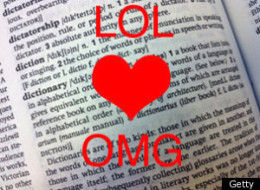网络上常用的缩略语LOL(放声大笑)和OMG(我的天)近日被收录到牛津英语词典中,同时收录其中的还有表达爱心的♥符号。这些缩略语“与电子交流方式息息相关,有助于在有限的字符中传递更多信息。”根据牛津英语词典的解释,LOL最早现身于二十世纪六十年代,它最初的意思是Little Old Lady(小老太太),进入网络时代后才演变为Laughing out Loud(放声大笑),在网络交流中非常普遍。OMG则早在1917年就已现身,是在一封个人邮件中第一次出现的,为Oh My God的缩写;而♥这个符号最一目了然,在牛津英语词典中被定位动词,表示“爱”的意思,比如:I♥U,即“我爱你”。

 |
|
The Oxford English Dictionary, will now include ♥ and LOL as real words worthy of etymological recording. |
The stalwart bastion of language, the Oxford English Dictionary, will now include ♥ and LOL as real words worthy of etymological recording.
Other words added include the formidable OMG. As they say, 'words" like these "are strongly associated with the language of electronic communications," and have entered the mainstream because of how easy they are to use.
Online, "initialisms" as they call them, are faster to type (as in texts and tweets) and, crucially, "help to say more in media where there is a limit to a number of characters one may use in a single message."
But the rise of these all-caps acronyms has impacted the non-electronic world as well. Found "in print, and even in spoken use" the OED notes "there often seems to be a bit more than simple abbreviation going on."
When you're LOL-ing in real life, apparently your e-shorthand helps you connote that you are using an "informal, gossipy mode of expression" or even going so far as to "parody the level of unreflective enthusiasm or overstatement that can sometimes appear in online discourse, while at the same time marking oneself as an 'insider' au fait with the forms of expression associated with the latest technology." Only the OED could bring such levels of meaning to the simple OMG.
Though they found that such words are usually associated with "a younger generation," the dictionary's meticulous research unturned a few startling early uses. OMG first appears in a 1917 personal letter and LOL dates to 1960, though it used to mean "little old lady" and not "laugh out loud."
None of this explains why "wassup" made the cut this time round.
The full definitions for ♥ and LOL below:
♥ to heart
The new sense added to heart v. in this update may be the first English usage to develop via the medium of T-shirts and bumper-stickers. It originated as a humorous reference to logos featuring a picture of a heart as a symbol for the verb love, like that of the famous 'I ♥ NY' tourism campaign. Our earliest quote for this use, from 1984, uses the verb in 'I heart my dog's head', a jokey play on bumper stickers featuring a heart and a picture of the face of a particular breed of dog (expressing a person's enthusiasm for, say, shih-tzus) which itself became a popular bumper sticker. From these beginnings, heart v. has gone on to live an existence in more traditional genres of literature as a colloquial synonym for 'to love'.
LOL
Originally and chiefly in the language of electronic communications: 'ha ha!'; used to draw attention to a joke or humorous statement, or to express amusement.
相关阅读
(Agencies)

(中国日报网英语点津 Helen 编辑)